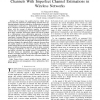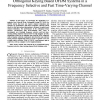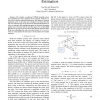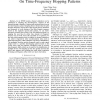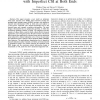112
click to vote
VTC
2007
IEEE
15 years 9 months ago
2007
IEEE
— The use of multiple transmit and receive antennas in combination with multicarrier modulation, e.g. MIMO-OFDM, is a very promising technique for future wireless communication s...
132
click to vote
INFOCOM
2007
IEEE
15 years 9 months ago
2007
IEEE
— We propose the quality-of-service (QoS) driven power allocation schemes for parallel fading channels when considering imperfect channel estimations. In particular, the parallel...
130
click to vote
ICC
2007
IEEE
15 years 9 months ago
2007
IEEE
— The combined OFDM/SDMA approach has raised lots of research interests recently as it appears to be quite suitable for future broadband wireless transmission. In order to build ...
125
click to vote
ICC
2007
IEEE
15 years 9 months ago
2007
IEEE
In this paper, we investigate the application of a unipolar Non-Coherent M-ary Orthogonal Keying (NC-MOK) for OFDM system that does not require channel estimation and compare its p...
ICC
2007
IEEE
15 years 9 months ago
2007
IEEE
—Optimal receiver diversity combining employing linear channel estimation is examined. Based on the statistical properties of pilot-assisted least-squares (LS) and minimum mean s...
103
click to vote
ICC
2007
IEEE
15 years 9 months ago
2007
IEEE
— MIMO system design for real applications requires that factors such as channel estimation errors, feedback quantisation and realistic channel responses be taken into account. L...
102
click to vote
ICC
2007
IEEE
15 years 9 months ago
2007
IEEE
— By the generalized multi-carrier (GMC) principle a unified framework to describe various multi-carrier as well as single carrier approaches is established. In this paper1 the ...
110
click to vote
ICC
2007
IEEE
15 years 9 months ago
2007
IEEE
— We consider a multi-user MIMO downlink where the transmitter has only estimates of the channel while the receivers have perfect channel information. The impact of channel estim...
111
click to vote
ICC
2007
IEEE
15 years 9 months ago
2007
IEEE
— In an OFDM system, channel estimation can be considered as sampling the time-frequency response of the channel through a number of known pilot symbols placed across the time-fr...
124
click to vote
ICC
2007
IEEE
15 years 9 months ago
2007
IEEE
— This paper presents a new result on minimum total mean squared error (MSE) joint transceiver design for multiple-input multiple-output (MIMO) systems, with imperfect channel st...

